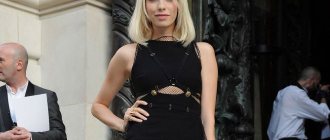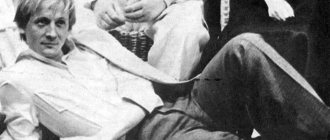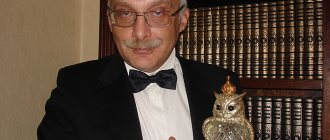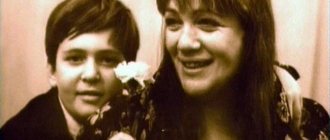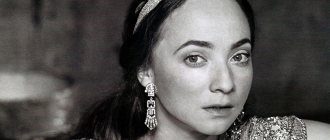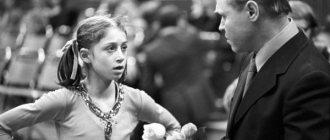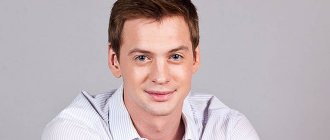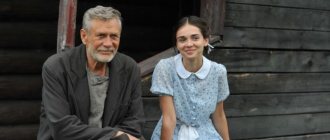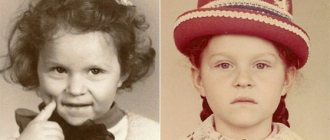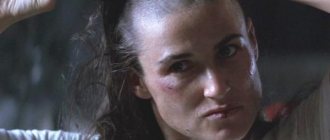Evgenia Sinelnikova in the project “Heads and Tails” and other TV shows
In 2001, Evgeny Sinelnikov tried himself as an actor - he starred in the mini-series “Don’t Leave Me, Love” in the role of Lena’s classmate Kirill. He worked as a cameraman in 2005 on the set of the film “Pavlov’s Dog.”
Evgeny Sinelnikov’s career as a production director was much more fruitful. He worked on several videos and television programs. Evgeniy filmed the show “Family Dog,” as well as all seasons of “Kitchen with Dmitry Shepelev,” a culinary project produced by the Inter TV channel.
Evgeniy's fame came when he took on the entertaining travel show “Heads and Tails.” In 2011, Sinelnikov became the permanent director of the program, starting from the 1st season of the show, when Alan and Zhanna Badoev were the hosts. Later, Evgeniy also became the director of “Heads and Tails. Shopping."
Evgeny Sinelnikov tried himself as a presenter quite recently - in the fall of 2014, when in Bordeaux he had to replace Kolya Serga, who was late for the plane, in the frame. Evgeniy got used to the role and was liked by the producers. Since then, he has been hosting this program together with Regina Todorenko. And Evgeniy notes that this is a completely different job - not only to manage the filming process, but also it is interesting to show a new place: “I discovered a lot for myself, I began to better understand the same presenters with whom I worked before.”
Interesting Facts
- Sinelnikov’s first book, “Love Your Illness,” was published 20 years ago, when he was a student and writing his dissertation. At some point, the young man thought that his scientific work would not benefit people and would gather dust on a shelf, but the book would help them gain health. That's how it happened.
- The doctor created his school thanks to letters from readers who came to him in huge numbers. They wrote that they learned very late about the things he wrote about in the book.
- Many readers confessed to Valery that his books helped change their lives, get rid of bad habits and even recover from a fatal disease.
- The doctor illustrates some of his books himself, choosing soft colors and delicate landscapes.
Interests of Evgeny Sinelnikov
The director and presenter fully lives his work, in the literal sense of the word, giving “all of himself.” In one of his interviews, he said that the idea of creating “Heads and Tails” was to show other people’s cities in an interesting way. And not general information about famous sights, but what you will tell your friends. “The idea was to come up with a project in which we could all enjoy the process,” Evgeny Sinelnikov once shared. That’s why the creative team working on the “Heads and Tails” project tries to show and tell moments that excited, surprised and delighted them.
A television
His first project was a TV show on the Inter TV channel called “Family Dog,” dedicated to pets, where families with children were asked to choose a shaggy friend from four different dogs in four days. The chosen dog remained to live with the family, and the remaining dogs could be adopted by TV viewers themselves by calling the hotline.
Working moments
Evgeny Sinelnikov’s next work in 2013 was the culinary show “Kitchen with Dmitry Shepelev” on the Inter TV channel, in which the director worked in all seasons. Thanks to the excellent director's work and the charisma of the host, the show was a huge success among the audience.
Evgeniy Sinelnikov
Evgeny Sinelnikov loves music. Previously, the guy was the bass guitarist of a rock band, but such a band performed only for friends. In one of the interviews, he admitted that he was not trained in music, and to participate in the group he only needed to undergo instruction in playing string instruments.
Evgeniy Sinelnikov currently
In one of the interviews, Evgeny Sinelnikov spoke about the difficulties. They, according to him, are connected with never ceasing to admire and be surprised by new places and events. The audience today is quite demanding, many travel around the world just as much as the presenters. Therefore, you need to present information to the audience that will inspire them to travel to a certain country to see this place.
Also among the difficulties, the director highlights the ban on filming in many places. Therefore, you often have to take pictures “from under your coat,” work with cameras, and the like. Sometimes they use tricks. For example, in New York, in the Tiffany & Co boutique, they had to say that the presenter wants to propose to his girlfriend - this moment needs to be filmed. The staff, who did not understand Russian, allowed it, after which work could continue.
And, most importantly, tell the truth about the place where the filming is taking place. “Official permission to film often spoils the picture. Because you can no longer say that the establishment is complete shit,” Sinelnikov once said. And he added that they are not trying to scold, they are simply talking about their personal impressions. What saves the team is that not everyone understands Russian.
Evgeniy Sinelnikov has not yet decided who he prefers to work in – presenter or director. But he notes that these are completely different tasks, and they are equally complex. The presenter’s jokes can “stretch out” the program if there are not many interesting places in the city being filmed. But the director needs to initially think through the route, make a selection of interesting places and figure out how to show them. Fortunately, Evgeny Sinelnikov masterfully manages to combine both of these roles, thanks to which the program “Heads and Tails” has been successfully broadcast for 9 seasons in a row. And in 2014, the project, as the best entertainment show, received an award from SNOB magazine, as well as the Russian TEFI. Therefore, viewers will continue to see the journeys of two friends, whose fate is decided by a coin. But whether Evgeny Sinelnikov will work as a presenter or only as a director is not yet known for sure.
Activities for the benefit of people
For several years Valery was a practicing doctor and at the same time engaged in writing. Adhering to the view that a person should be in harmony with the world around him, he developed his theory, according to which all diseases appear if a person violates universal laws. The homeopathic doctor believes that there is no need to be afraid of illness, because this means that we have accumulated negative thoughts and the body has become polluted. And all because the person led the wrong lifestyle. It is important to understand that viruses and bacteria are our friends, because they, in fact, help cleanse the body.
photo https://www.instagram.com/sinelnikovvaleri/
Sinelnikov revealed all his thoughts and knowledge in his own books, such as:
- "The Power of Intention";
- “Vaccination against stress”;
- "Secrets of the subconscious";
- "Way to Wealth";
- “The mysterious power of the word. Love Formula";
- "Health Mandalas"
Many readers tried his methods for themselves, and then noted that they really work.
photo https://www.instagram.com/sinelnikovvaleri/
In the 2000s, Valery’s School, which he opened in Crimea, began to operate. Its teachers teach people the exact sciences, languages, music, but with an emphasis on Slavic roots. Seminars in Svetoche are not only about gaining deep knowledge about human nature and the world around us, unique practices, but also about making new friends and like-minded people. Sinelnikov and his students pay special attention to the relationship between men and women, creating a happy family, conception and birth of healthy children, and the topic of fatherhood and motherhood.
In their lessons they also cover topics such as:
- Acceptance of your uniqueness and originality;
- Cleansing the soul and body;
- Laws of wealth and prosperity;
- The path of a man and others.
At master classes, the doctor talks with people, conducts morning practice and meditation. The whole group greets the morning sun, prays, swims in the sea and goes on a journey to the New World. On the territory of the educational and recreational ethnocultural center “Svetoch” in Crimea, festivals are also held in which parents with children, teachers and psychologists take part. At this practical training, issues of pedagogy, upbringing and education of children are discussed, and recreation is organized for the whole family.
Personal life of Evgeny Sinelnikov
Evgeniy is married to a creative personality like himself, Elena Sinelnikova.
She is the co-author of Heads and Tails, producer and CEO of the Teen Spirit production studio, which is making this project. The common cause contributes to the fact that Evgeniy does not part with his wife for a long time - they quite often fly together for filming.
The situation with my son is different. The boy lives in Zaporozhye with Evgeniy’s parents. And the director admits that he misses him a lot. Upon arrival in Ukraine, Evgeniy immediately goes to his son: “This is my sore point and the main reason why I may not agree to the next season.”
Childhood and youth
Valery Sinelnikov was born on November 21, 1966 in Vladivostok, and spent his early childhood in the Ussuri taiga, where his father served as an officer in the missile forces. Over time, the family moved to Simferopol, where the boy went to school with a physics and mathematics focus. He graduated with a gold medal and entered the Crimean Medical University. Studying at the university ended with receiving a honors diploma and an internship.
View this post on Instagram
A post shared by Valery Sinelnikov (@sinelnikovvaleri) on Dec 11, 2020 at 11:40pm PST
Doctor Valery Sinelnikov
Then Sinelnikov came to Russia, where he studied homeopathy and psychotherapy. The result of the knowledge gained and its analysis was the book “Love Your Illness,” which the young man began writing while still a student. The work was published in 1999.
Sinelnikov was interested not only in medicine, but also in the parallel study of spiritual movements from yoga and Sufism to Taoism and Vedic practices. The young man was also interested in esotericism and neurolinguistic programming.
Healing and books
Forming his own theory, Sinelnikov followed the idea that a person should exist in harmony with the world around him, which works according to the laws of the Universe. It must be comprehended not only physically, but also psychologically, because the mental level is one step higher in human development. Valery's views were formed under the influence of the works of Louise Hay and Sergei Lazarev, Stanislav Grof and Carlos Castaneda.
Our view of the world
There are no two people on our planet whose fingerprints would match completely. Also, there are no two people whose life paths would be the same. For example, even the character and behavior of identical twins differ, despite the fact that they are raised in the same family.
In other words, each person lives in his own small reality and creates his own “exclusive” universe. Every child, from childhood, under the influence of parents, adults, teachers, and the environment, creates his own reality, his own worldview. As a result, the child formed his own idea of the world, which is in some ways similar and in some ways different from the parent’s. Most children from childhood were taught to perceive reality in some special, “correct” way. This process is simply necessary because, by being involved in it, a person feels more harmonious. But often people are so carried away by this activity that they forget one simple truth: there is a huge difference between real reality and our idea of it. Sinelnikov, according to reviews of psychotherapists and psychologists, takes as the basis for his teaching the theory of the “power of human thought”
From birth, people create a model of the world, a model of reality, in which they live their entire lives, trying to somehow change this model for the better. There are no bad or good models. The main question is how effective and useful the model is. On the one hand, our idea helps to take advantage of all the achievements that world civilization has created over several thousand years, and on the other hand, it creates limitations, reinforcing the conviction that our far from ideal model is the real reality. And this deception takes you far from reality and creates a feeling of dissatisfaction.
There is one paradox: after all, a person really lives in reality and unconsciously perceives it as it is - as something incomprehensible, complex, but is only aware of the model of this reality, on the creation of which he spends all his life and energy.
[edit] Criticism
Priest Jacob Ambartsumov, Home Church of St. Paul the Apostle at the Mariinsky Hospital[2]:
Kurpatov, like Sinelnikov, do not believe in God. They have a purely pagan concept of the world. But this does not mean that every phrase they say is incorrect. They often say things that can be found in the Gospel, in the Bible, in the lives of the saints, but their teaching is mixed with the falsity of their ideas about religion, in particular Christianity. They should join the church, become Christians, imagine what benefit they would bring to the world, given their talents.
E. G. Batrakov, psychoanalyst, member of the coordinating council of the All-Russian association “Optimalist”[3]:
“Sinelnikov’s teaching” is a very strong word. It makes sense to talk about a compilation of views, about a rather clumsy system of ideas stolen from real thinkers of our time, such as S. N. Lazarev, D. Grinder, R. Bandler and others <...> Since Sinelnikov and others like him deny morality - there is no good and evil, there is only useful, that is, profitable - they thereby declare their immorality and bring themselves under the dictionary definition: “mean - low in moral terms, lackey, slave, servile.”
What you need to know about the subconscious
Long before the development of the theory of psychoanalysis, famous ancient doctors wrote about the existence of the so-called inner mind. In the twentieth century, the great Freud identified four “parts” in the human consciousness: ego, id, superego and preconscious, each of which performed specific functions. This model played a crucial role in the development of psychology. Subsequently, other methods began to emerge: psychoanalysis according to Jung’s method, automatic writing, Wiener’s cybernetic model, behaviorism, Gestalt psychology, transactional analysis, neurolinguistic programming and Ericksonian hypnosis. At the moment, psychotherapists and psychologists agree that the human mind can be divided into two components: consciousness and subconsciousness.
It should be understood that this division is conditional. Personality is an integral system. Scientists and psychologists believe that the subconscious is that particle of the unknown and completely unknown human essence that we need to try to unravel. The subconscious can be compared to the underwater part of an iceberg. This part of the mind is much larger than consciousness and is closed from us. All information about human life is stored in this hidden part of the psyche. The subconscious mind stores the memory mechanism, controls all functions of the body through our nervous system, reflexes and instincts, automatic actions and habits.
Guilt
But let's return to Sinelnikov's book. Most of the negative emotions and actions that lead to illness are taken from the Holy Scriptures, notably, even with references. A quotation from the Gospel placed next to a quotation from a book of occult philosophy cannot but touch the feelings of a Christian.
Most “wrong thoughts” do not cause concern: hatred, condemnation, fornication, pride... And here we read that a violation of the “law of the universe” is a feeling of guilt (!), self-criticism, self-condemnation. At this stage, the reader learns from Sinelnikov to kill his repentant feeling. I believe this is a most destructive activity that closes a person’s path to repentance, and therefore to self-improvement, self-change, and self-knowledge. How can a person learn to see his shortcomings differently and fight them if he loses the ability to look critically at his life, at himself?
When the author talks about feelings of guilt, he also expresses his thoughts in relation to the so-called spirits of malice. Sinelnikov abolishes the personality of God, but he also denies the machinations of the evil one. “The devil is our harmful, aggressive and destructive thoughts and feelings.” Denial of the existence of demons, as is known, only benefits the latter.
Quote from V. Sinelnikov: “If God and Truth are hidden inside each of us, then it turns out that by judging ourselves, we condemn God; by criticizing ourselves, we criticize God.”
These words inflict the deepest wound on the mind that seeks God. As a result, he finds not God, but the evil one in disguise.
This is the kind of damage to the mind that comes from identifying God with something unknown and with whom. In general, complete ignorance in religious terms, which nevertheless does not exempt one from responsibility.
